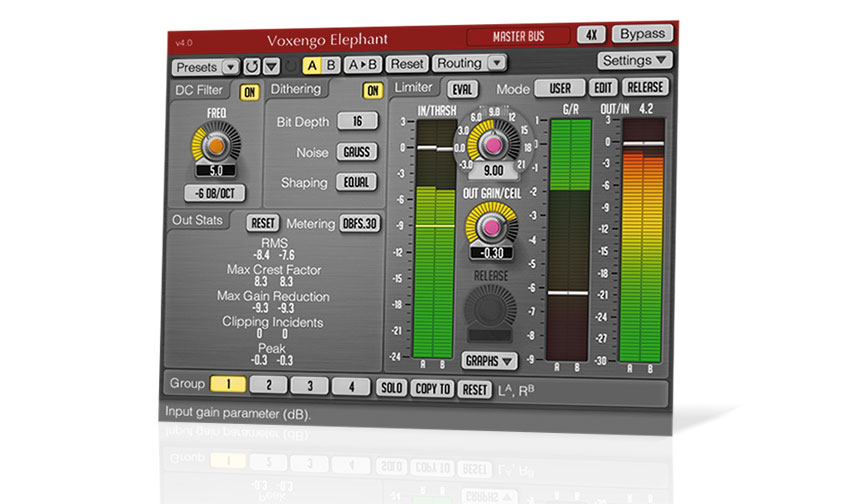MusicRadar Verdict
Elephant 4 is one of the best-sounding, most informative mastering limiters and metering plugins that money can buy - simple as that.
Pros
- +
Astounding detail. Supremely smooth, transparent results. Comprehensive metering options. Well-realised presets.
Cons
- -
Nothing!
MusicRadar's got your back
Fundamentally, Elephant (check out ourVoxengo Elephant V3 review from 2008) is a mastering limiter plugin (VST/AU) with up-to-5.1 surround capability; but what make it special beyond its stellar performance as a limiter are its analysis and metering features.
"What makes Elephant special beyond its stellar performance as a limiter are its analysis and metering features"
The output signal is analysed for RMS values, maximum crest factor and maximum gain reduction. Meanwhile, the ten metering setups include three K-metering options (see K-metering), and three dBFS peak options that show the same but with different amplitude scales.
Elephant's functionality centres on a Mode, which is a combination of parameters: Knee, Channel Linking, Timing, Release/Attack Ratio, Release Shape and View, and Transient Time, Shape and View; together with one of a selection of eight limiting algorithms - Clip, four different Auto Input Gain Control types, and a variety of others - designed to strike a range of balances between transparency, loudness and distortion, since limiting is, ultimately, a trade-off between these factors. Mode settings can be saved to or recalled as a Mode Preset, and several of the parameters and algorithms are new in v4.
Other settings outside the Mode include DC Filter for removing unwanted DC Offset, which would otherwise affect the headroom; Dither for high-quality bit-depth conversion; up to 8x oversampling for higher quality operation (less noise/aliasing artifacts) at the expense of greater CPU hit; and a pop-out graph window showing gain reduction and output waveform against time. The Mode and all of these other settings can be saved together as a full Preset.
Heavyweight champion
In use, Elephant feels comfortable, solid and assured. It gives the mastering engineer everything they could possibly need in terms of metering and limiting, and while it's easy to overcook things by pushing it too far, the plugin does everything it can to keep the results smooth and transparent.
The precision and detailing of the parameters, plus the ability to A/B changes as you make them and see the gain reduction over time graphically, are all incredibly helpful, while the metering options cover all bases - in particular K-metering, which is fast becoming the de facto standard for pro mastering engineers.
Another notably useful operational feature (new in v4) is the Eval switch, which reduces the processed output to the same level as the bypassed signal, enabling quick and easy checking for distortion artifacts.
Want all the hottest music and gear news, reviews, deals, features and more, direct to your inbox? Sign up here.
Ironically, the success of a limiter is largely down to how invisible it is - you don't want to hear it working until you A/B it with the unprocessed track - and in that respect, Elephant is highly successful. You can fine-tune it to create very smooth yet very loud masters, and if you're not just into 'loud', you can also use its analysis tools to make sure you're keeping the dynamic range you want.
This is about as deep as plugin limiters get, so really knowing what you're doing is essential to getting the best out of it. You can of course just pick one of the (excellent) presets and adjust the input knob, but to get under its skin is to truly open up a world of possibility.
Computer Music magazine is the world’s best selling publication dedicated solely to making great music with your Mac or PC computer. Each issue it brings its lucky readers the best in cutting-edge tutorials, need-to-know, expert software reviews and even all the tools you actually need to make great music today, courtesy of our legendary CM Plugin Suite.

